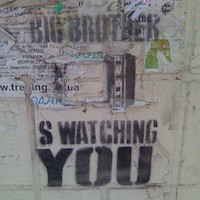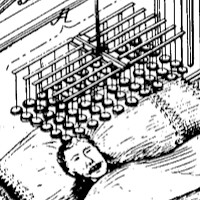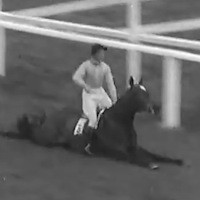First Day of George Orwell’s 1984

“It was a bright cold day in April, and the clocks were striking thirteen.” With that immortal line, we enter the fraught world of Winston Smith, low-ranking government bureaucrat in Airstrip One, Oceania. He has come home to Victory Mansions during his lunch break, although he has no food other than a bit of bread for the next day’s breakfast. It doesn’t matter, though, because he’s really there to do something else. He’s there to start a diary.
In this dystopia, watched by Big Brother through telescreens and patrolled by police in helicopters, keeping a diary is not actually illegal. Yet it is a crime punishable by death, “or at least by twenty-five years in a forced-labor camp.” This is an example of doublethink – “the power of holding two contradictory beliefs in one’s mind simultaneously, and accepting both of them.” Doublethink is a cornerstone of Ingsoc, the political ideology of the ruling Inner Party.
So Winston hides from the telescreen that surveils him even as it transmits a dull economic news program on pig-iron production. Sitting in an alcove built for bookshelves, Winston opens the diary and writes: “April 4th, 1984.”
He continues fitfully, sitting back in a panic one moment and scribbling frantically the next, until he realizes he doesn’t really want to ramble on about the propagandist war flick he saw the night before. What compelled him to start the diary is what happened at the office that morning. As he participated in the daily Two Minutes Hate at the Ministry of Truth, Winston had felt no hostility toward Emmanuel Goldstein, the Enemy of the People. He realized that his rage was so manufactured that he could switch its target at will from Goldstein to Big Brother to Julia, the woman he would later fall in love with. He could dissemble and “do what everyone else was doing” while keeping his thoughts hidden. He was capable of thoughtcrime. He was committing thoughtcrime.
In the alcove, when his eyes refocus on his diary, Winston sees that he has filled half a page with one sentence over and over again: “DOWN WITH BIG BROTHER.”
So begins his downfall.
The ever-imminent Orwellian future
The details of Nineteen Eighty-Four draw us completely into its world, but by the time the year came to pass, George Orwell’s depiction of the future remained just that. Even Singapore, where I was living in 1984, was not at all a totalitarian state although it was frequently criticized for its one-party political system. As the year began, a New York Times article concluded that Big Brother had not conquered “the free world” even though “commercial interests try to doctor the news and sometimes succeed, elected officials are tempted to misrepresent the truth, government agencies attempt to and sometimes do invade the privacy of the individuals, and military leaders feel compelled to hide some of their activities.”
Wait a minute. Doesn’t that sound like our world today? In fact, right next to that article in my web browser now, one item listed in the “Most Emailed” sidebar is “Police Body Cameras: What Do You See?” The juxtaposition is sobering, even though I know the cameras are supposed to protect U.S. citizens, not spy on them. So how far have we really moved forward from Nineteen Eighty-Four? Has the ever-imminent Orwellian future really come and gone?
Not entirely, perhaps. Consider Edward Snowden, low-ranking defense-contractor employee at the National Security Agency. When he revealed in 2013 that the NSA monitored U.S. citizens’ emails, texts and telephone calls, sales of Nineteen Eighty-Four shot up 6,000 percent, according to Amazon.com. Six thousand percent. Clearly, many readers saw parallels between the proles in Orwell’s novel and the unsuspecting citizens in the NSA’s mass-surveillance program.
In 2015, news broke of another parallel. Like Orwell’s telescreens, certain models of Samsung’s Smart TV could allegedly spy on you! Samsung’s privacy policy stated: “If your spoken words include personal or other sensitive information, that information will be among the data captured and transmitted to a third party through your use of Voice Recognition.” Who knew how third parties could use our words against us? Yet, as CNET.com pointed out, many devices we might already own “have similar speech features that are always listening.” Feeling uneasy? Just switch off those features. Winston couldn’t do that with his telescreen.
What might happen, though, when the much-heralded “internet of things” arrives? This is when all our devices and appliances wlll be networked with each other via WiFi. You would never come home to an empty kitchen because your fridge could get your phone to order a pizza before your car left the office parking lot. Already on the market is Nest, which started out as a “smart” thermostat but can now control your smoke detector, garage door, lightbulbs, washer and dryer, and a HD video camera right from your Google account – your Big Data repository. The Nest Cam has Night Vision and a mic, and stores 30 days’ worth of video. According to a Guardian article on Feb. 9, 2016, the U.S. national intelligence director himself stated that “in the future, intelligence services might use the [internet of things] for identification, surveillance, monitoring, location tracking, and targeting for recruitment, or to gain access to networks or user credentials.” We have been warned.
It is a future not far beyond us and well within Orwell’s bleak vision. This – a future when Big Something is always watching us – is the part of Nineteen Eighty-Four we are still afraid may come true. Worse: it may already be true. Our only hope is to fare better than Winston Smith.
In this dystopia, watched by Big Brother through telescreens and patrolled by police in helicopters, keeping a diary is not actually illegal. Yet it is a crime punishable by death, “or at least by twenty-five years in a forced-labor camp.” This is an example of doublethink – “the power of holding two contradictory beliefs in one’s mind simultaneously, and accepting both of them.” Doublethink is a cornerstone of Ingsoc, the political ideology of the ruling Inner Party.
So Winston hides from the telescreen that surveils him even as it transmits a dull economic news program on pig-iron production. Sitting in an alcove built for bookshelves, Winston opens the diary and writes: “April 4th, 1984.”
He continues fitfully, sitting back in a panic one moment and scribbling frantically the next, until he realizes he doesn’t really want to ramble on about the propagandist war flick he saw the night before. What compelled him to start the diary is what happened at the office that morning. As he participated in the daily Two Minutes Hate at the Ministry of Truth, Winston had felt no hostility toward Emmanuel Goldstein, the Enemy of the People. He realized that his rage was so manufactured that he could switch its target at will from Goldstein to Big Brother to Julia, the woman he would later fall in love with. He could dissemble and “do what everyone else was doing” while keeping his thoughts hidden. He was capable of thoughtcrime. He was committing thoughtcrime.
In the alcove, when his eyes refocus on his diary, Winston sees that he has filled half a page with one sentence over and over again: “DOWN WITH BIG BROTHER.”
So begins his downfall.
The ever-imminent Orwellian future
The details of Nineteen Eighty-Four draw us completely into its world, but by the time the year came to pass, George Orwell’s depiction of the future remained just that. Even Singapore, where I was living in 1984, was not at all a totalitarian state although it was frequently criticized for its one-party political system. As the year began, a New York Times article concluded that Big Brother had not conquered “the free world” even though “commercial interests try to doctor the news and sometimes succeed, elected officials are tempted to misrepresent the truth, government agencies attempt to and sometimes do invade the privacy of the individuals, and military leaders feel compelled to hide some of their activities.”
Wait a minute. Doesn’t that sound like our world today? In fact, right next to that article in my web browser now, one item listed in the “Most Emailed” sidebar is “Police Body Cameras: What Do You See?” The juxtaposition is sobering, even though I know the cameras are supposed to protect U.S. citizens, not spy on them. So how far have we really moved forward from Nineteen Eighty-Four? Has the ever-imminent Orwellian future really come and gone?
Not entirely, perhaps. Consider Edward Snowden, low-ranking defense-contractor employee at the National Security Agency. When he revealed in 2013 that the NSA monitored U.S. citizens’ emails, texts and telephone calls, sales of Nineteen Eighty-Four shot up 6,000 percent, according to Amazon.com. Six thousand percent. Clearly, many readers saw parallels between the proles in Orwell’s novel and the unsuspecting citizens in the NSA’s mass-surveillance program.
In 2015, news broke of another parallel. Like Orwell’s telescreens, certain models of Samsung’s Smart TV could allegedly spy on you! Samsung’s privacy policy stated: “If your spoken words include personal or other sensitive information, that information will be among the data captured and transmitted to a third party through your use of Voice Recognition.” Who knew how third parties could use our words against us? Yet, as CNET.com pointed out, many devices we might already own “have similar speech features that are always listening.” Feeling uneasy? Just switch off those features. Winston couldn’t do that with his telescreen.
What might happen, though, when the much-heralded “internet of things” arrives? This is when all our devices and appliances wlll be networked with each other via WiFi. You would never come home to an empty kitchen because your fridge could get your phone to order a pizza before your car left the office parking lot. Already on the market is Nest, which started out as a “smart” thermostat but can now control your smoke detector, garage door, lightbulbs, washer and dryer, and a HD video camera right from your Google account – your Big Data repository. The Nest Cam has Night Vision and a mic, and stores 30 days’ worth of video. According to a Guardian article on Feb. 9, 2016, the U.S. national intelligence director himself stated that “in the future, intelligence services might use the [internet of things] for identification, surveillance, monitoring, location tracking, and targeting for recruitment, or to gain access to networks or user credentials.” We have been warned.
It is a future not far beyond us and well within Orwell’s bleak vision. This – a future when Big Something is always watching us – is the part of Nineteen Eighty-Four we are still afraid may come true. Worse: it may already be true. Our only hope is to fare better than Winston Smith.
You Should Also Read:
Utopia vs Dystopia in Literary Fiction
Person of Interest
1984 - The Apple Macintosh Ad

Related Articles
Editor's Picks Articles
Top Ten Articles
Previous Features
Site Map
Content copyright © 2023 by Lane Graciano. All rights reserved.
This content was written by Lane Graciano. If you wish to use this content in any manner, you need written permission. Contact Lane Graciano for details.







